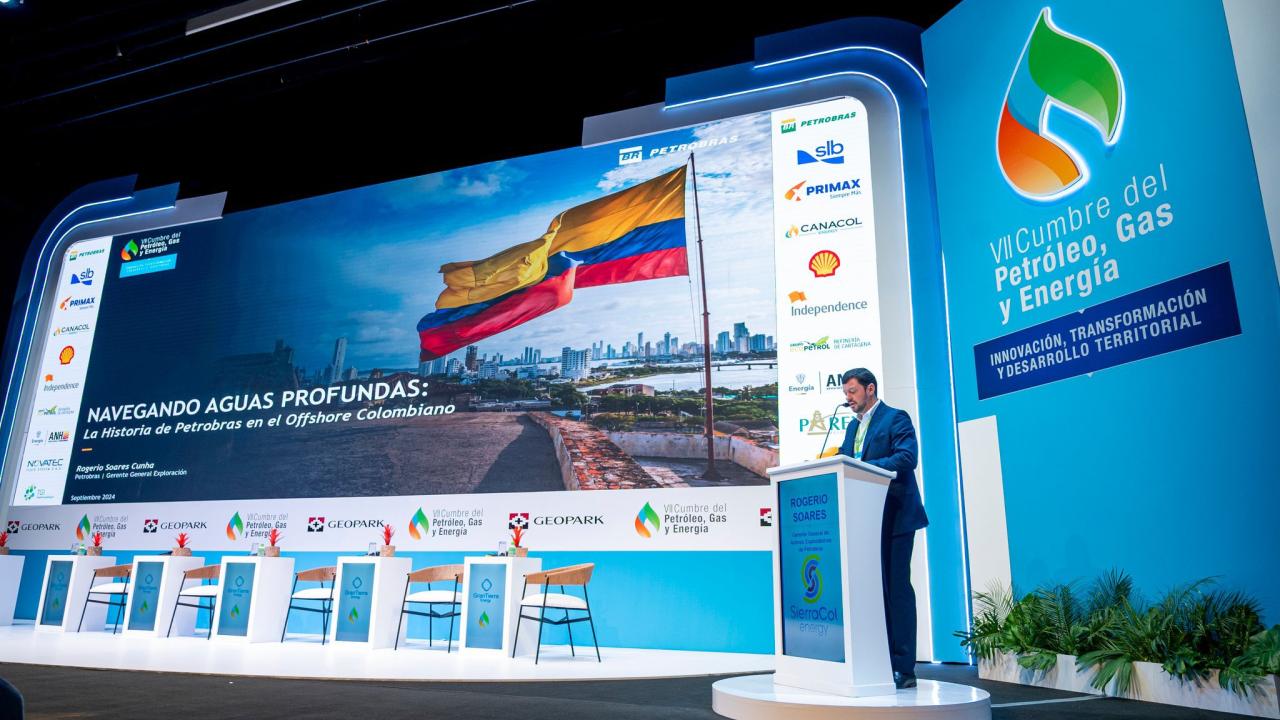
According to Petrobras' general manager of exploration, Rogerio Soares, this is the most important gas discovery ever made in Colombia.
At the 7th Oil, Gas and Energy Summit (organized by the ACP, Campetrol, the Colombian Association of Engineers and the ACGGP), Petrobras exploration manager Rogerio Soares confirmed that Sirius is already the most important gas discovery ever made in Colombia.
In his presentation, Soares explained that Sirius is made up of four producing wells, and that its expected production is 13 million cubic meters of gas per day over the next 10 years.
Specifically, Sirius's (formerly known as Uchuva) proven reserves totaled 2.3 trillion cubic feet (Tcf), giving it the potential to double the country's proven reserves.
According to the National Hydrocarbons Agency (ANH), this discovery is somewhat larger, as it estimates 6 trillion cubic feet in the entire GUA-OFF-0 block (formerly known as Tayrona), which in itself represents 2.5 times the proven reserves in the country. “We have gas!” he celebrated.
Remember that proven reserves (1P) are those that have a reasonable certainty of being recovered under current economic and technological conditions; probable reserves (2P) are those that have a 50% chance of being extracted; while possible reserves (3P) are those that have only a 10% chance of being extracted.
In short, this announcement is very good news for the country, considering that for several months now it has been reported that Colombia will lose its energy self-sufficiency by 2025 and 2026, which would make it necessary to import gas to meet national demand.
We must wait for the announcements from Ecopetrol, Petrobras and the Ministry of Mines and Energy on this matter, as the question remains as to how and when the extraction of this hydrocarbon will begin, and whether with this, the import of gas will no longer be necessary.
An announcement that could have been delayed
The magnitude of this news is considerable for the country, since natural gas is not only a highly demanded commodity (both for domestic and industrial use), but also because it constitutes an important element for advancing towards the energy transition.
However, this announcement could have been delayed, since a few weeks ago a judge ordered Petrobras and Ecopetrol to suspend work on the aforementioned well because, in his opinion, the right to prior consultation of the Tayrona Indigenous Community had not been respected (that is, he considered that they had not been taken into account for the work, as established by law, nor the impacts that it could have represented).
At the time, the Ministry of Mines and Energy challenged the decision of this judge, with the support of other entities and institutions with authority in this matter, arguing that a prior consultation process was not carried out because the work on the well (due to its location) does not affect the aforementioned indigenous community.
However, some compromises had to be accepted, including changing the name of the well (since for the indigenous community the name “Uchuva” is a cultural appropriation), hence why it is now known as Sirius.
That gas will take a while to arrive
According to what the director of the ACGGP, Flover Rodríguez, explained to El Espectador , the aforementioned discovery is the result of more than 20 years of work carried out by Ecopetrol and its partner Petrobras.
However, he stressed that the project is still in an exploratory phase, which must evolve towards the development of the project, which means that there is still a lot of hard work to be done.
"The pipeline that will bring the gas from the platform to the coast must be built, and to do so, a number of very necessary tasks must be completed," he said.
To begin with, the director points out, the environmental license must be obtained, as well as some 116 prior consultations with the communities that could be impacted by this project (there are quite a few and the precedent with the Tayrona Indigenous Community must be taken into account).
In short, he estimates that the gas found could be arriving in the country in four or five years, since the licensing stage would take one year, plus another three that it would take Ecopetrol to develop the project.
“We must recognize that, although these are important resources that are coming to the country, they will not arrive in the time necessary in the short term to solve the gas supply issue. That is why we need to look again at the mainland, at the continent, to dedicate ourselves to exploring in areas where we have already had gas production. These are areas where we could easily connect the gas that is discovered to put it at the service of the center and the Caribbean region of the country, which will have a significant demand in the coming years,” he concluded.










